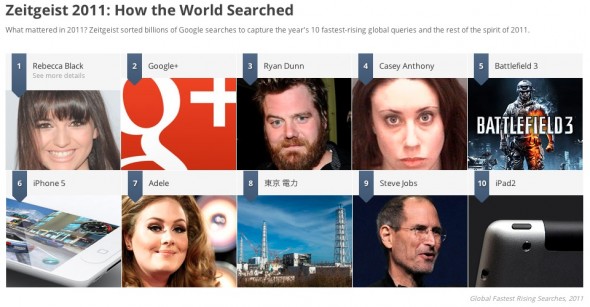Last year, I published a diatribe against Google Zeitgeist and how it plays fast and loose with the definition of “zeitgeist.” I argued that rather than “capture the defining spirit or mood” of the times, Google Zeitgeist audaciously and erroneously presented the aggregated search activities of its users as the spirit of the times. Not as ingredients or specific examples of larger social trends that make up the zeitgeist, but the zeitgeist itself. The fact that “Chatroulette” was the number one entry on their list was strong evidence in support of my argument. As far as ephemeral and ultimately inconsequential internet crazes go, it’s hard to top Chatroulette.
Unless you’re Rebecca Black, the accidental YouTube sensation, and the number one entry in 2011’s Google Zeitgeist:

I’m sorry. Did you forget that Rebecca Black and “Friday” happened? Let me remind you:
In a way, I suppose that the dilemma of choosing between the front seat and the back seat is indicative of the great policy split of our era between advocates of government intervention in macroeconomics and advocates of a more laissez-faire approach. In a way.

Keynes vs. Hayek: which seat should I taaaake?
But in all seriousness, it’s clear that, once again, the Google Zeitgeist is anything but a zeitgeist. It doesn’t represent the true spirit of the times; it just represents what people search for on the internet (celebrities and technology news, plus a horrific disaster thrown in for good measure). But it does represent something significant, given the ubiquity of Google and its position as the first stop for many people on their way to other parts of the internet. So with that in mind, let’s use this as an opportunity to revisit the Rebecca Black “Friday” phenomenon, several months after its peak and likely at one of her last moments of relevance in pop culture.
 For those of you who lost interest in Rebecca Black several months ago, here’s a quick update on her post- “Friday” adventures. She’s released two other songs, appeared in the Katy Perry music video “Last Friday Night,” and even scored an endorsement deal with Australian telecom company Telstra. That’s the good news. The bad news is that her subsequent singles have seen diminishing success, much less anything close to the notoriety achieved by “Friday,” and worst of all, she was bullied out of her middle school.
For those of you who lost interest in Rebecca Black several months ago, here’s a quick update on her post- “Friday” adventures. She’s released two other songs, appeared in the Katy Perry music video “Last Friday Night,” and even scored an endorsement deal with Australian telecom company Telstra. That’s the good news. The bad news is that her subsequent singles have seen diminishing success, much less anything close to the notoriety achieved by “Friday,” and worst of all, she was bullied out of her middle school.
She was the most searched for person on the entire Internet, she appeared in a Katy Perry music video, and yet, she experienced the ultimate alienation that any young person could face: exile from her school and her peer group. In the same year. She went from complete anonymity to near-total ubiquity to the ash heap of history (or at least to its outer edges). In the same year.
It would be too easy to ascribe this extreme volatility to the fast-paced, zero attention span information age. That certainly is at play here, but what’s far more interesting (not to mention relevant to the ostensible topic of this article, Google Zeitgeist), is the accidental, serendipitous nature of the whole affair. Presumably, nobody sat down with a master plan to create a song/music video so terrible and yet so appealing that it would catapult a nondescript middle-school girl into worldwide fame and the top of a list of most popular searches on Google for the year. Technology allowed this accident to happen, but it’s still an accident. An exception that proves the rule that, in spite of oddball viral fads that produce huge sensations from the grassroots, our world views are still dominated by hegemonic influencers and tastemakers, just as they were in the days before the Internet.
Look at the rest of the top ten list.

Six of the top ten are essentially the products of huge corporate publicity machines: a major label musician (Adele), mass market technology products (Battlefield 3, Google+, the iPhone, and the iPad), and the man who ran one of the best corporate publicity machines of all time. The other three are essentially current event items: Ryan Dunn, the Jackass star who was killed in a car accident, Casey Anthony, the subject of a sensational trial, and the aforementioned Japanese tsunami/nuclear disaster.
Rebecca Black may avoid the seemingly inevitable fate of obscurity and go on to a long and successful career as a musician. But assuming she doesn’t, she will remain an exception, an accident, rather than a truly zeitgeist-defining moment.
Which was a very long way of saying what we knew along: that the Google Zeitgeist isn’t a zeitgeist at all.
Oh. I don’t know. Doesn’t that prove that Rebecca Black is the most Zeitgeist of them all? She would be more the spirit of 2011 if this this is the only year she matters. And if this is part of some sort of trend, that also proves it is a zeitgeist.
The song “Friday” was resurrected as part of a Kohl’s commercial in the weeks before Black Friday.
I feel bad for Rebecca Black. As awful as the song was, she certainly didn’t deserve to receive death threats on her YouTube video.
Interestingly, I think you could probably make the opposite case using similar facts. I agree with you that it’s tough to say “Rebecca Black is the zeitgeist of 2011,” but she could certainly be indicative of it. Specifically, I think the “fast-paced, zero attention span information age” is actually really well-illustrated by Black’s rise and fall.
The problem with defining any kind of zeitgeist for this period is that same low attention span you describe. How can we make a claim to any “spirit, attitude, or general outlook of a specific time or period, esp as it is reflected in literature, philosophy, etc” (dictionary.com) when we lack the necessary focus as a generation to maintain a “spirit, attitude, or general outlook” for any extended period of time, or to express ourselves through “literature, philosophy, etc.” in any way more complicated or thought-provoking than whatever gets shoveled into Memebase day in and day out? If we want to make the argument – one for which sufficient substantiating evidence could probably be found within two or three degrees of separation if you followed links off of this or any site – that we’re a population that doesn’t really have a defining spirit, what better icon to choose than Rebecca Black? If “ephemeral and ultimately inconsequential” is how we’re choosing to define ourselves, how can we do better than someone who rose to internet fame for no reason and subsided almost immediately? It’s also got a nice bit of paradox to it: a generation that doesn’t have enough of an attention span to have a defining trend, defined by the trend of not having enough of an attention span to have a defining trend. Now you can throw in irony and paradox to the zeitgeist, and you’re starting to encapsulate other, maybe more significant trends in our culture. This carries into our buying power as a population: stores like Urban Outfitters and other “indie” styles, if you can have an “indie style”, sites like woot.com that celebrate purchases of “bags of crap,” etc. are all indicating that we like things that are bad, maybe ironically, maybe legitimately, but enthusiastically – if only for a short time, before we move on to something else that’s bad. It’s mocking, and in ways it’s self-mocking, and it kind of comes off as a desperate attempt to define ourselves by what we are superior to, by what we can afford to consume despite its being awful and then discard immediately. That, to me, feels like the kind of zeitgeist that Rebecca Black might be indicative of.
That said, I’m going to add a big B U T to my above argument: But those things that are Googled en masse don’t actually represent widespread cultural trends, because they’er going to favor a particular and damn small segment of the world population. I must admit to some not insubstantial ignorance of Google Zeitgeist at this point (I didn’t know about it until this article, and have looked at it twice since): for example, I don’t know whether these results were only English results, or only American results, but I can’t imagine really that there’s a way to compile the feeling of an era through the Internet. Internet users as a whole aren’t the whole world population, and not even the whole intellectual population of the world (since, let’s face it, a conversation about “zeitgeist” is always going to tend towards [over]intellectualization). These trends are going to be seriously impacted by a largely white, largely western, largely privileged society that has the time and means to dick around on the internet watching Rebecca Black and then the self-importance to whine about her. You could argue that the people actually producing literature or philosophy are not doing that many Google searches, and those seeking them (maybe an older population?) will not necessarily do so through the internet. All of this is to say: I agree, Google Zeitgeist isn’t a zeitgeist at all, primarily because it lacks the sufficient cultural and social scope to ever effectively measure what it is that we as a world are truly motivated and inspired by.
That said, I’d love to see someone analyze the lyrics to “Friday” as really summarizing the working-class apathy towards everything other than short-term necessity (gotta have my bowl, gotta have cereal), anxiety about peer groups (which seat can I take?) and self-anesthetization (everybody looking forward to the weekend). Mmm? Mmm?
The thing about Rebecca Black (and every other item on google’s zeitgeist list) is that they became that widely searched for for a reason. There is something about each of them that taps deeply into the public mind. Black wasn’t just popular with the students at my school. She was popular with the teachers. And the administrators. And my parents. Everybody — EVERYBODY — was fascinated with her video. When something has that wide and significant an appeal, I would argue that it’s precisely part of the zeitgeist. That is how it becomes so popular and therefore so widely searched for.